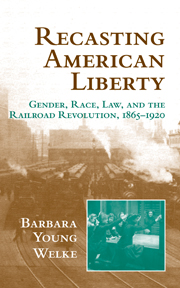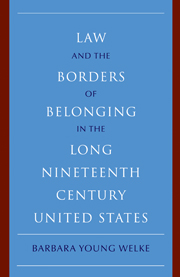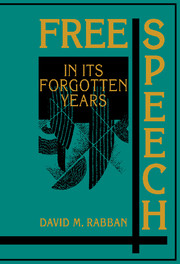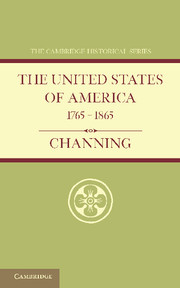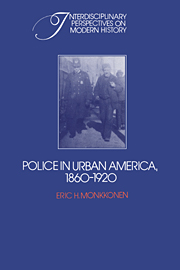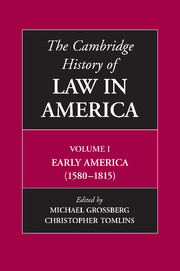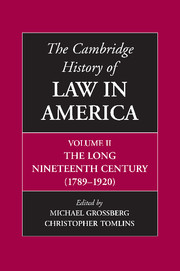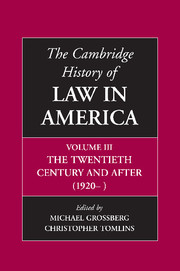Recasting American Liberty
Gender, Race, Law, and the Railroad Revolution, 1865–1920
$135.00 (C)
Part of Cambridge Historical Studies in American Law and Society
- Author: Barbara Young Welke, University of Minnesota
- Date Published: August 2001
- availability: Available
- format: Hardback
- isbn: 9780521640206
$
135.00
(C)
Hardback
Other available formats:
Paperback
Looking for an examination copy?
This title is not currently available for examination. However, if you are interested in the title for your course we can consider offering an examination copy. To register your interest please contact [email protected] providing details of the course you are teaching.
-
Through courtroom dramas from 1865 to 1920, Recasting American Liberty offers a dramatic reconsideration of the critical role railroads, and their urban counterpart, streetcars, played in transforming the conditions of individual liberty at the dawn of the 20th century. The three-part narrative, focusing on the law of accidental injury, nervous shock, and racial segregation in public transit, captures Americans' journey from a cultural and legal ethos celebrating manly independence and autonomy to one that recognized and sought to protect the individual against the corporate power, modern technology and modern urban space.
Read more- Will appeal to historians of gender and race as well as legal historians
Reviews & endorsements
"In this well-written book, Barbara Young Welke offers a thoughtful and comprehensive analysis...[her] book should appeal to scholars in many fields, especially those interested in law..." American Journal of Sociology
See more reviews"Welke has written a perceptive and intriguing analysis that not only sheds light on the social and communal effects of rail traffic but also provide a glimpse of the personal consequences of technological change, safety regulations, and policy decisions....This well-organized and extensively documented work considers the significance of such issues as physical and psychological injuries associated with rail traffic as well as the role that gendered policies and racial segregation played in the meaning of individual liberty in industrializing the US." Choice
"[An] outstanding work of social and legal history..." Journal of Interdisciplinary History
"Welke's study...is a welcome addition to the growing literature on how railroading shaped legal culture. Based upon meticulous research in legal records, it will stimulate debate and deserves a large audience." H-Net: Humanities and Social Sciences Online
Customer reviews
Not yet reviewed
Be the first to review
Review was not posted due to profanity
×Product details
- Date Published: August 2001
- format: Hardback
- isbn: 9780521640206
- length: 426 pages
- dimensions: 229 x 152 x 27 mm
- weight: 0.79kg
- contains: 17 b/w illus.
- availability: Available
Table of Contents
Part I. The Body: Accidental Injury:
1. The railway journey (i): the technological transformation
2. Gendered journeys (i): physical vulnerability
3. The law of accidental injury
Junction: pain and suffering
Part II. Mind and Body: Nervous Shock:
4. The railway journey (ii): the psychological transformation
5. Gendered journeys (ii): psychological vulnerability
6. The law of nervous shock
Junction: truth, legal storytelling, and the performance of injury
Part III. Person: Racial Segregation:
7. The Railway journey (iii): the spatial transformation
8. Gendered journeys (iii): status vulnerability
9. The law of racial segregation.
Sorry, this resource is locked
Please register or sign in to request access. If you are having problems accessing these resources please email [email protected]
Register Sign in» Proceed
You are now leaving the Cambridge University Press website. Your eBook purchase and download will be completed by our partner www.ebooks.com. Please see the permission section of the www.ebooks.com catalogue page for details of the print & copy limits on our eBooks.
Continue ×Are you sure you want to delete your account?
This cannot be undone.
Thank you for your feedback which will help us improve our service.
If you requested a response, we will make sure to get back to you shortly.
×
